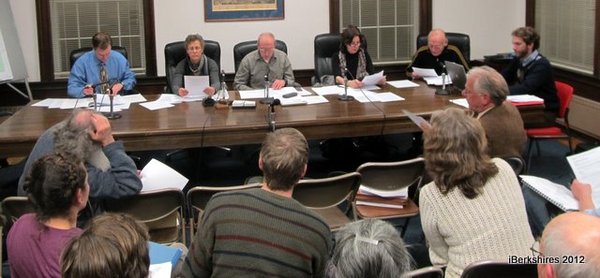Williamstown Planners To Recommend Bylaw ChangesBy Andy McKeever, iBerkshires Staff
02:57PM / Thursday, March 01, 2012 | |
 The Planning Board meeting lasted four hours while the planners worked with dozens of residents to reach compromises. The Planning Board meeting lasted four hours while the planners worked with dozens of residents to reach compromises. |
WILLIAMSTOWN, Mass. — After four hours of solidifying the language, the Planning Board voted to support zoning changes on Wednesday that will allow farms to host events and homeowners to add second dwelling units to their property.
The board has been weighing residents concerns for months and Thursday was their last chance at finalizing the changes they support. Dozens of residents filled the meeting room to add their two cents and worked to strike compromises with all sides of the issues.
The bylaw allowing farms to hold events was the most debated despite being a citizen's petition. The laws are being brought forth by Sherwood Guernsey and Cricket Creek Farm in hopes to earn extra income to help keep the farm alive. The law has taken many forms but the biggest change is that Guernsey's proposal will allow the events by special permit instead of by right.
"We felt that was very important because of the nature that each farm is different," Guernsey said. "Cricket Creek Farm, right now, is not making it."
The proposal faced opposition from some residents, particularly Town Moderator Mark Gold, who were concerned with noise levels, traffic and event times.
"Neighbors could be listening to music until 11:30 at night every weekend," Gold said and added that permits should only be granted for a year a time instead of multi-year to provide review.
To compromise, Guernsey agreed to add language that limits the number of weddings per year to six and cut back the time music must end from 11:30 p.m. to 11 p.m. However, a one-year permit would not work because weddings are often planned so far in advance, Guernsey said. The multi-year permit idea is intended to allow the farms to demonstrate to the Zoning Board of Appeals that they are being responsible and can build the multi-year trust, he said. But Guernsey did agree to add language that would give the ZBA the right to revoke the permits.
Residents, the board and Guernsey also debated the legal definition of a farm, which led to the proposal removing a clause that stipulated the law only applied to farms with a minimum of 100 acres, after Beth Phelps of SweetBrook Farm cited the state Right To Farm law. That bylaw not only clearly defines a farm but also allows them to hold agriculture-related events, which includes events that help market the farm. Guernsey and Phelps both said wedding do market the farm and its products.
While the Right to Farm bylaw seemed to make the local zoning laws irrelevant, Guernsey said that was what triggered the discussion. When the farm initially asked Building Commissioner Michael Card about the permitting, Card denied their request saying that weddings did not qualify as agricultural nor marketing. Guernsey then had the option of appealing through a lawsuit or lobbying to change the local laws.
As for the Planning Board led second dwelling bylaw, that also faced opposition because a former Planning Board member and two current ZBA member believed it would severely hurt property values.
The law, if passed, would allow residents to transform currently existing structures into rental units as well as allow a homeowner to build a new rental unit. However, the increased density of neighborhoods will hurt the resale value of homes, the opposition said.
"It just opens too many bad things that could come out," ZBA member Lawrence Wright said.
ZBA member David Levine said that the laws would give residents a "carte blanche" to change neighborhoods. However, those who opposed the law agreed with the idea behind it but thought it went too far - particularly by allowing residents to build new structures.
The bylaw is intended to allow large properties or farms that are no longer operating a chance to receive some income from their property by turning an old barn or garage into a "granny flat." The Planning Board limited the size of the construction and included that a converted structure must have been in existence for at least 10 years but that was not enough regulation for the opposition.
"This goes way beyond the intent," Andy Hogeland, a former Planning Board member, said.
The Planning Board changed some language to help strengthen regulations but ultimately decided that it was for the voters to decide. The bylaw had been re-written multiple times to address concerns. The bylaw will help fulfill what is in the town's master plan, board members said.
Williamstown Zoning Bylaw Changes 2012
|
|
|

 MEMBER SIGN IN
MEMBER SIGN IN
 MEMBER SIGN IN
MEMBER SIGN IN